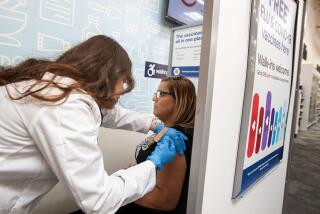The much-maligned flu shot has reduced the risk of serious illness this year by 36%, CDC says

This year’s flu shot is far from perfect, but it’s certainly better than nothing, according to a new report from the Centers for Disease Control and Prevention. (Feb. 15, 2018)
This year’s flu shot is far from perfect, but it’s certainly better than nothing, according to a new report from the Centers for Disease Control and Prevention.
Preliminary data from five sites around the country suggest that people who got vaccinated this flu season reduced their risk of getting a serious case of influenza by 36%.
That figure covers all types of flu viruses circulating in the United States.
About two-thirds of the viruses going around this year are of the H3N2 variety — the one that’s associated with more hospitalizations and deaths. Those who got a flu shot reduced their risk of being laid low by an H3N2 strain by 25%.
If that seems modest, consider this: Australia’s flu shot reduced the risk of getting H3N2 by 10%, and Canada’s vaccine reduced that risk by 17%, according to preliminary estimates. Neither of those amounts was large enough to be considered statistically significant.
The 25% decline in the U.S., on the other hand, was too big to be due to chance, the CDC report said.
The vaccine did a better job of protecting people against H1N1 flu strains — it reduced that risk by 67%. The flu shot also made serious infections with influenza B strains 42% less likely.
The effectiveness of the American flu shot appears to vary with age. For instance, it reduced the risk of getting a serious case of any type of flu by 59% among children ages 6 months through 8 years. (The vaccine isn’t recommended for infants younger than 6 months of age.) For adults between the ages of 18 and 49, it reduced the risk of a serious flu by 33%.
Other age groups saw more modest degrees of vaccine effectiveness, ranging from 5% to 18%. But these risk reductions were too small for researchers to be sure they were more than a statistical fluke.
All these calculations were based on 4,562 children and adults who contracted an “acute respiratory illness” that was bad enough to send them to a doctor between Nov. 2, 2017, and Feb. 3, 2018. These patients were seen at the five universities and hospitals that make up the U.S. Influenza Vaccine Effectiveness Network (Kaiser Permanente in Seattle, the Marshfield Clinic Research Institute in Wisconsin, the University of Michigan School in Ann Arbor, the University of Pittsburgh and Texas A&M University).
Respiratory specimens for all of these patients were sent to laboratories, and 38% of them came back positive for influenza.
Among the patients with influenza, 43% had gotten the 2017-2018 seasonal flu shot. Among the patients who didn’t have influenza, 53% received the vaccine.
The calculations of vaccine effectiveness — that is, how much the flu shot reduced one’s risk of getting the flu — take into account the age, sex, race, ethnicity and geographic location of patients, as well as their general health and how long they had a respiratory infection before they went to see a doctor.
With February halfway over and springtime nearly in sight, procrastinators might be feeling that it’s too late to get a flu shot. The CDC has two words for these people: It’s not.
“Several more weeks of influenza activity are likely,” the report authors warned. “Vaccination will still prevent influenza illness, including thousands of hospitalizations and deaths.”
During the 2014-2015 influenza season, the flu shot reduced the risk of serious illnesses by less than 20%. Even so, researchers estimated that the vaccine prevented somewhere between 11,000 and 144,000 flu-related hospitalizations and 300 to 4,000 flu-related deaths.
A final accounting of vaccine effectiveness will come out after the end of the flu season, which might occur as late as May.
The new study was published Thursday in the CDC’s Morbidity and Mortality Weekly Report.
Follow me on Twitter @LATkarenkaplan and “like” Los Angeles Times Science & Health on Facebook.
MORE IN SCIENCE
FDA approves first blood test that can help diagnose a concussion
Even with pledges to fight global warming, you’d better brace yourself for more extreme weather
In soil-dwelling bacteria, scientists find a new weapon to fight drug-resistant superbugs







